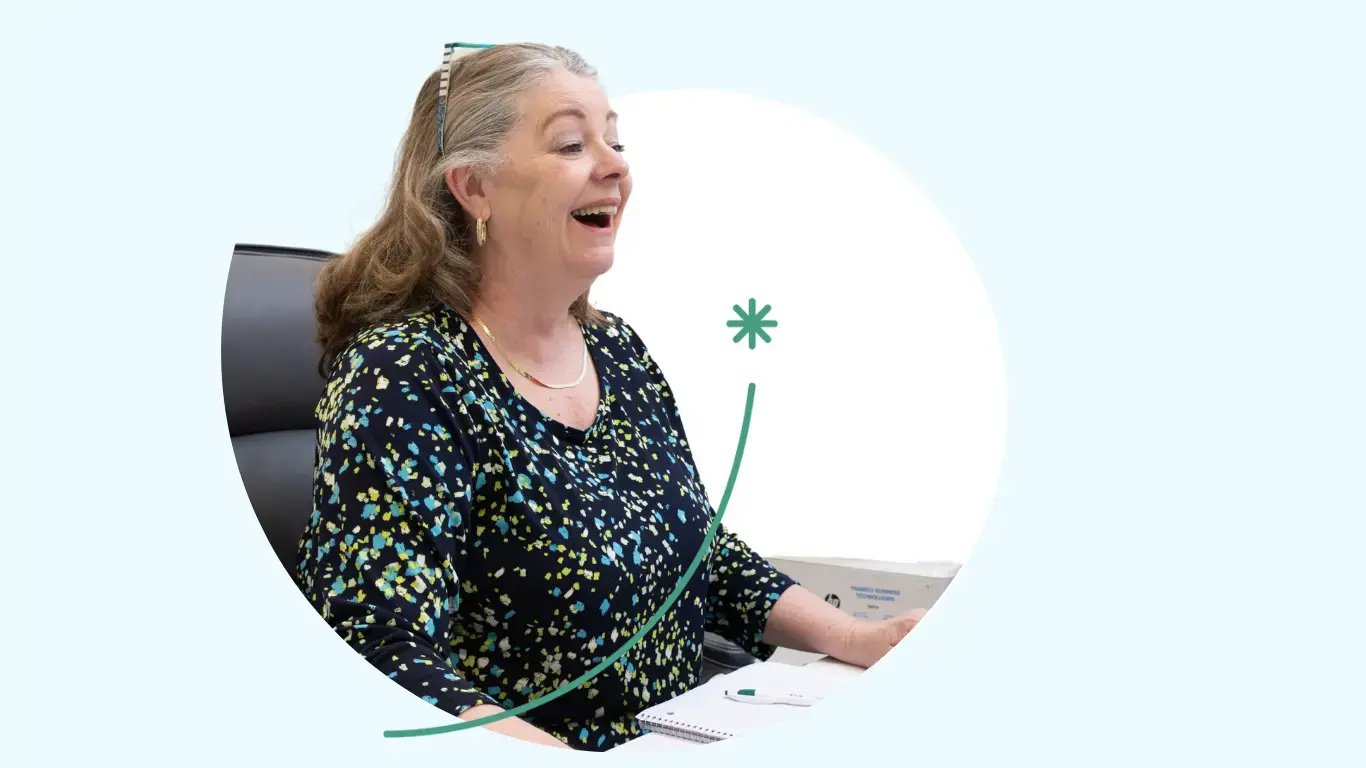
Your Maine Partner for Payroll and HR Services
Payroll today is so much more than just payroll
Between constantly shifting compliance laws, rising employee expectations, and the increasing complexity of running a business, it’s no longer enough to just “run payroll.” You need a local partner who can guide you through it all.
That’s where Paper Trails comes in.
Explore all of our integrated payroll & HR services
Looking for more information? Contact our team here!

Recent Payroll & HR Blog Posts
Your employees are the most important part of your business. And if you are a busy business owner or HR manager, it can be difficult to find the time...
Hiring in healthcare has become one of the hardest tasks for HR managers. Once you finally find the right person, the last thing you want is to lose...
Offering health benefits to your employees is one of the most important things you can do as a business owner. But between the different options...

Straightforward and Reliable Payroll Pricing
Our pricing is simple with no nickel and diming (we hate that!). Once our team learns about your business and its’ needs, we will provide a quote for services based on the pricing below.
Weekly or Bi-Weekly Payrolls
Billing occurs each time payroll is processed.
From $43
Plus $4.50 per active employee
- For weekly or bi-weekly payrolls.
- One-time implementation fee starting at $500.
Monthly or Quarterly Payrolls
Billing occurs each time payroll is processed.
From $125
Plus $6.00 per active employee
- For monthly or quarterly payrolls.
- One-time implementation fee starting at $500.
What's included in our payroll plans
- Dedicated payroll & HR expert assigned to your business. Each of our members works with businesses just like yours and will be side-by-side with you as you navigate this evolving legislative landscape.
- Select the direct deposit and pay schedule that best fits your business’ needs and your employees’ budgets. Choose from weekly, bi-weekly, semi-monthly, and monthly direct deposits.
- Enjoy unlimited payroll deductions, wage garnishments, and reports whenever you need them. Any employee changes flow directly into payroll to reduce errors and save time.
- Tax reconciliation, payments and filings for quarterly and year-end federal and state tax forms while ensuring you’re always in compliance.
- 24/7 access for you and your employees. Employees can access their self-service account from their mobile app anywhere at anytime. As the employer, you gain access to the full online payroll portal allowing you to manage every aspect of your business.
- Enjoy no-hassle paid time off tracking to streamline requests, manage balances and stay in compliance with state mandates.
- Workers' comp-as-you-go administration allowing you tp pay your premium each pay period instead of upfront bills based on annual projections. We partner with local providers including MEMIC, Eastern Alliance, Acadia, and AmTrust to find a plan that meets your needs.
- Electronically store and track employee documents, company assets, certifications, licenses and more. Stay in compliance with I-9 rules via E-verify integration.
- Through integrations with select retirement carriers, Paper Trails will electronically transmit employee and employer retirement contributions.
- We will build a custom general ledger report for easy integration to your accounting system or Quickbooks.
- Let us create and deliver custom reports in the systemthat measure what matters most to you and your business.
- Resources to keep you up-to-date including blog posts, checklists, podcast episodes and expert-led monthly trainings on a variety of payroll and HR compliance topics and software demos.
- Additional features like integrations with TurboTax and Equifax’s The Work Number allow you to work smarter. The Employee Marketplace is a place where employees can take advantage of discounts and cash back on thousands of brands and save on items such as travel, entertainment, meals, retail. Plus, there's more tools for you - just ask!
Why Paper Trails?
At Paper Trails, we’re more than just a payroll and HR service provider—we’re your neighbors. As a local small business, we don’t hide behind 800 numbers or automated systems. Our team of friendly, knowledgeable experts lives and works right here in southern Maine, ensuring you get personalized support whenever you need it.
Whether it’s payroll processing, compliance guidance, or HR support, we’re always just around the corner, ready to help your business thrive with convenient, high-tech, and fully compliant solutions.

What people are saying about our payroll & HR services
Our company switched from a mega payroll company to Paper Trails and we are so happy we did! The staff are extremely knowledgeable, professional and helpful! It's wonderful to have a local person you can pick up the phone and call if you have a question or a problem. Would highly recommend!!
Wendi Saracino, D&C Home Care

We began with Paper Trails at the beginning of 2020 and have never once regretted the decision. Jeff, Chris, and Teresa have all made the process amazingly seamless which has let us focus on so many other important things to continue to grow our business. Paper Trails has saved me countless hours and headaches over the last few years. Congdon’s Doughnuts is better equipped for future growth thanks to Paper Trails.
Jillian Shomphe, Congdon's Doughnuts

From start to finish, the team at Paper Trails keeps my finances in order in a professional and fun way.
Dr. Tim Coffin, Slocum Chiropractic
Frequently Asked Payroll & HR Questions
-
Each business will endure a different cost for running payroll depending on a variety of factors, including the number of employees, types of services needed, and frequency of your pay period. Our base pricing for weekly or biweekly payrolls starts at $43 per payroll run plus $4.50 per employee.
Read more here about some of our general pricing methods, and reach out to us to get a more detailed quote.
-
At Paper Trails, we offer a full range of payroll, HR, and compliance services designed to simplify your business operations and keep you compliant with ever-changing regulations. Our services include:
- Payroll Processing – Accurate, timely payroll with tax filings, direct deposits, and customized reporting.
- Compliance Assistance – Guidance on labor laws, tax regulations, and industry-specific requirements to ensure your business stays on track.
- Time & Attendance Solutions – Streamlined tracking and reporting to manage employee hours, PTO, and scheduling.
- Employee Benefits Administration – Assistance with benefits enrollment, deductions, and compliance with state and federal laws.
- Labor Law Poster Compliance – Providing updated labor law posters and digital ePoster services to meet posting requirements.
- Onboarding Tools – Seamless digital solutions to onboard new employees efficiently, ensuring proper documentation and compliance from day one.
- Expense Management – Simplified tools to track and manage employee expenses, ensuring accuracy and efficiency in reimbursements.
Our solutions are designed to be intuitive, scalable, and customized to meet the unique needs of small and mid-sized businesses in Maine and surrounding states. Whether you're looking for a trusted partner to handle payroll or a comprehensive HR solution, we've got you covered!
Learn more about our services here. -
Yes! While our primary focus is on serving businesses in Maine, we also work with companies in the surrounding states, such as New Hampshire and Massachusetts. Additionally, we support Maine-based businesses that have employees working remotely across the country. Our team is well-versed in multi-state payroll and compliance requirements, ensuring your business stays compliant no matter where your employees are located. Currently, we work with businesses across about 30 states.
Whether you're a local company expanding beyond Maine or managing a remote workforce, we have the expertise and tools to support your payroll and HR needs.
-
We specialize in helping small to mid-sized businesses simplify their payroll, HR, and compliance needs. The majority of our clients are small businesses ranging from 1 to 100 employees. However, we also work with and support numerous larger clients with employee counts between 300 and 500. No matter the size of your business, our team provides personalized service and scalable solutions to meet your unique needs as you grow.
-
Outsourcing your payroll and HR helps you stay compliant with constantly changing labor laws and tax regulations, reducing the risk of costly errors and penalties. It also frees up your time to focus on running your business instead of dealing with complex administrative tasks. With expert support and efficient systems in place, you can ensure accuracy, compliance, and peace of mind—without the headaches.
-
At Paper Trails, we’re more than just a payroll and HR provider—we’re your neighbors. As a local Maine business, we offer personalized support with real people who answer the phone when you call—no 800 numbers or an automated voice saying "You are 27th in line. Thank you for your patience".
We’re committed to educating and empowering our clients with resources, training, and expert guidance to navigate the complexities of payroll and HR with confidence. Plus, we care deeply about our community, actively supporting local businesses and initiatives to help Maine thrive.
-
Getting in touch with us is easy! You can call our local team at 207-721-8575—no 800 numbers, just real people ready to help. You can also reach us by email at an employee's <firstname>@papertrails.com or through our website’s contact form.
If you are looking for help with login issues, you can check out our help page here for resources.
Whether you have a quick question or need in-depth support, our friendly experts are here to provide the personalized assistance you need.
You handle the work. We’ll handle the paperwork.
We’ll stay in the weeds to manage your payroll, Human Resources, and compliance needs.


.webp?width=300&height=300&name=Website%20Image%20(8).webp)

.webp?width=600&height=600&name=The%20Paper%20Trails%20Experience%20(4).webp)
